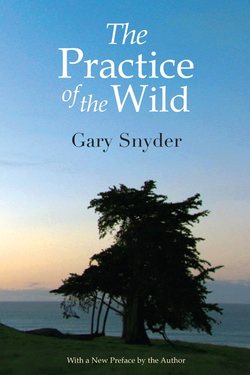Читать книгу The Practice of the Wild - Gary Snyder - Страница 12
На сайте Литреса книга снята с продажи.
Back Home
ОглавлениеThe etiquette of the wild world requires not only generosity but a good-humored toughness that cheerfully tolerates discomfort, an appreciation of everyone’s fragility, and a certain modesty. Good quick blueberry picking, the knack of tracking, getting to where the fishing’s good (“an angry man cannot catch a fish”), reading the surface of the sea or sky — these are achievements not to be gained by mere effort. Mountaineering has the same quality. These moves take practice, which calls for a certain amount of self-abnegation, and intuition, which takes emptying of yourself. Great insights have come to some people only after they reached the point where they had nothing left. Alvar Núñez Cabeza de Vaca became unaccountably deepened after losing his way and spending several winter nights sleeping naked in a pit in the Texas desert under a north wind. He truly had reached the point where he had nothing. (“To have nothing, you must have nothing!” Lord Buckley says of this moment.) After that he found himself able to heal sick native people he met on his way westward. His fame spread ahead of him. Once he had made his way back to Mexico and was again a civilized Spaniard he found he had lost his power of healing — not just the ability to heal, but the will to heal, which is the will to be whole: for as he said, there were “real doctors” in the city, and he began to doubt his powers. To resolve the dichotomy of the civilized and the wild, we must first resolve to be whole.
One may reach such a place as Alvar Núñez by literally losing everything. Painful and dangerous experiences often transform the people who survive them. Human beings are audacious. They set out to have adventures and try to do more than perhaps they should. So by practicing yogic austerities or monastic disciplines, some people make a structured attempt at having nothing. Some of us have learned much from traveling day after day on foot over snowfields, rockslides, passes, torrents, and valley floor forests, by “putting ourselves out there.” Another — and most sophisticated — way is that of Vimalakirti, the legendary Buddhist layman, who taught that by directly intuiting our condition in the actually existing world we realize that we have had nothing from the beginning. A Tibetan saying has it: “The experience of emptiness engenders compassion.”
For those who would seek directly, by entering the primary temple, the wilderness can be a ferocious teacher, rapidly stripping down the inexperienced or the careless. It is easy to make the mistakes that will bring one to an extremity. Practically speaking, a life that is vowed to simplicity, appropriate boldness, good humor, gratitude, unstinting work and play, and lots of walking brings us close to the actually existing world and its wholeness.
People of wilderness cultures rarely seek out adventures. If they deliberately risk themselves, it is for spiritual rather than economic reasons. Ultimately all such journeys are done for the sake of the whole, not as some private quest. The quiet dignity that characterizes so many so-called primitives is a reflection of that. Florence Edenshaw, a contemporary Haida elder who has lived a long life of work and family, was asked by the young woman anthropologist who interviewed her and was impressed by her coherence, presence, and dignity, “What can I do for self-respect?” Mrs. Edenshaw said, “Dress up and stay home.” The “home,” of course, is as large as you make it.
The lessons we learn from the wild become the etiquette of freedom. We can enjoy our humanity with its flashy brains and sexual buzz, its social cravings and stubborn tantrums, and take ourselves as no more and no less than another being in the Big Watershed. We can accept each other all as barefoot equals sleeping on the same ground. We can give up hoping to be eternal and quit fighting dirt. We can chase off mosquitoes and fence out varmints without hating them. No expectations, alert and sufficient, grateful and careful, generous and direct. A calm and clarity attend us in the moment we are wiping the grease off our hands between tasks and glancing up at the passing clouds. Another joy is finally sitting down to have coffee with a friend. The wild requires that we learn the terrain, nod to all the plants and animals and birds, ford the streams and cross the ridges, and tell a good story when we get back home.
And when the children are safe in bed, at one of the great holidays like the Fourth of July, New Year’s, or Halloween, we can bring out some spirits and turn on the music, and the men and the women who are still among the living can get loose and really wild. So that’s the final meaning of “wild” — the esoteric meaning, the deepest and most scary. Those who are ready for it will come to it. Please do not repeat this to the uninitiated.
